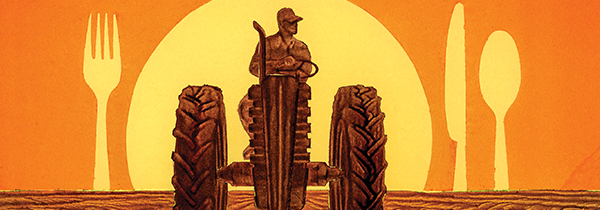 |
 |
||||||||||||||
| Discover Create Enlightened Palate Music for Pterodactyls Private Lives of the Civil War Scholar At LargeQuality of Light Haunted by Kafka Mixed Media Act ConnectDepartments |

Enlightened Palate
EAT THE WHOLE FARM, ADVISES ONE OF AMERICA’S TOP CHEFSTo illustrate the past, present, and future of American cooking, Dan Barber would have you visualize three different plates of food. The first plate, representing the mainstream of twentieth-century American cooking, holds a seven-ounce steak with a small side of carrots. The second exemplifies the farm-to-table style popularized by food writers and chefs like Barber, A92—dishes that are seasonal, artisanal, and local, but often modeled on their conventional predecessors. This plate holds a seven-ounce grass-fed steak with organic heirloom baby carrots.
On the third plate—the one Barber is experimenting with at the two restaurants he co-owns, Blue Hill in Manhattan and Blue Hill at Stone Barns, in Westchester County, New York—is a “carrot steak” embellished with a sauce containing braised bits of beef. This seemingly topsy-turvy meal could hold the key to restoring balance to a food-production system that has become unsustainable.
The third plate emerged from Barber’s efforts to perfect the second plate. His innovative and artful fare had made him a leader in the farm-to-table movement—a winner of several James Beard awards, the foodie Oscars—and helped shepherd a change in the way Americans cook and eat. People were learning to appreciate the creamy richness of a golden-yolked egg laid yesterday by a free-range chicken, and to rediscover apples of various shapes, sizes, and hues that once filled nearby orchards before mass-market Red Delicious took over.
Like an alchemist in search of the philosopher’s stone, Barber quested after the secret to cultivating great-tasting ingredients. He kept meticulous records of the produce and livestock grown and raised at the Stone Barns Center, a nonprofit agricultural complex that surrounds the Westchester County restaurant. For every piece of lamb he served, he could tell you when the animal had been born, who its mother was, what grass it had eaten, and so on.
But as he sought to uncover the key to deliciousness in his data, he realized he’d been going about it the wrong way. “I was asking only about the lamb,” he said recently. The recipe for delicious lamb, he learned, starts long before the lamb is even born. “I wasn’t asking about the crop rotation that supported the lamb’s diet. I wasn’t asking about the other animals on the farm. I wasn’t asking about any of the in-between crops that also supported the farmer.”
He has written a book, The Third Plate: Field Notes on the Future of Food (Penguin), to consider just such questions. In it, he tells of farmers and scientists who are pushing the frontiers of sustainable agriculture. He aims to persuade cooks and consumers to quit building menus around a handful of celebrated ingredients and instead choose foods with an eye toward the viability of the land.
So, Barber says, if you want those peak-of-summer Brandywine tomatoes—a water-hogging crop that depletes the soil—you also need to cook with kidney beans, millet, and mustard greens. Those less glamorous crops build soil structure, replenish nitrogen, and keep plant diseases at bay. But because not enough people buy them, farmers either sell such crops for animal feed, at a loss, or don’t even grow them. “That’s very dangerous from an ecological point of view, and economically from the farmer’s point of view,” Barber says.
Barber didn’t set out to turn the culinary world on its head. He began his career as an apprentice at La Brea Bakery in Los Angeles, after Sol Gittleman—former Tufts provost, current University Professor—egged him on. In the spring of his senior year, Barber had mentioned a vague notion that he wanted to bake bread. The next day, in a German literature class, Gittleman beseeched an auditorium full of students to follow their passion in life. “I have a guy here who wants to be a baker!” he declared.
“And all of a sudden, I became a baker,” says Barber, who insists that his liberal arts education has not gone to waste. Cooking “is a liberal arts craft in many ways,” he says. “To understand it, you need to expand your mind beyond cooking.”
That is what the “third plate” concept asks people to do, as they consider the whole ecosystem of food, from sustainable farming to sustainable dining. “You’ve heard the phrase ‘nose-to-tail eating’?” Barber asks, referring to the practice of creating dishes from all parts of an animal. “This is nose-to-tail eating of the farm. We need to be more attuned to the nuts and bolts of farming, because it’s the nuts and bolts that provide true sustainability.”
HELENE RAGOVIN is a senior writer at Tufts.